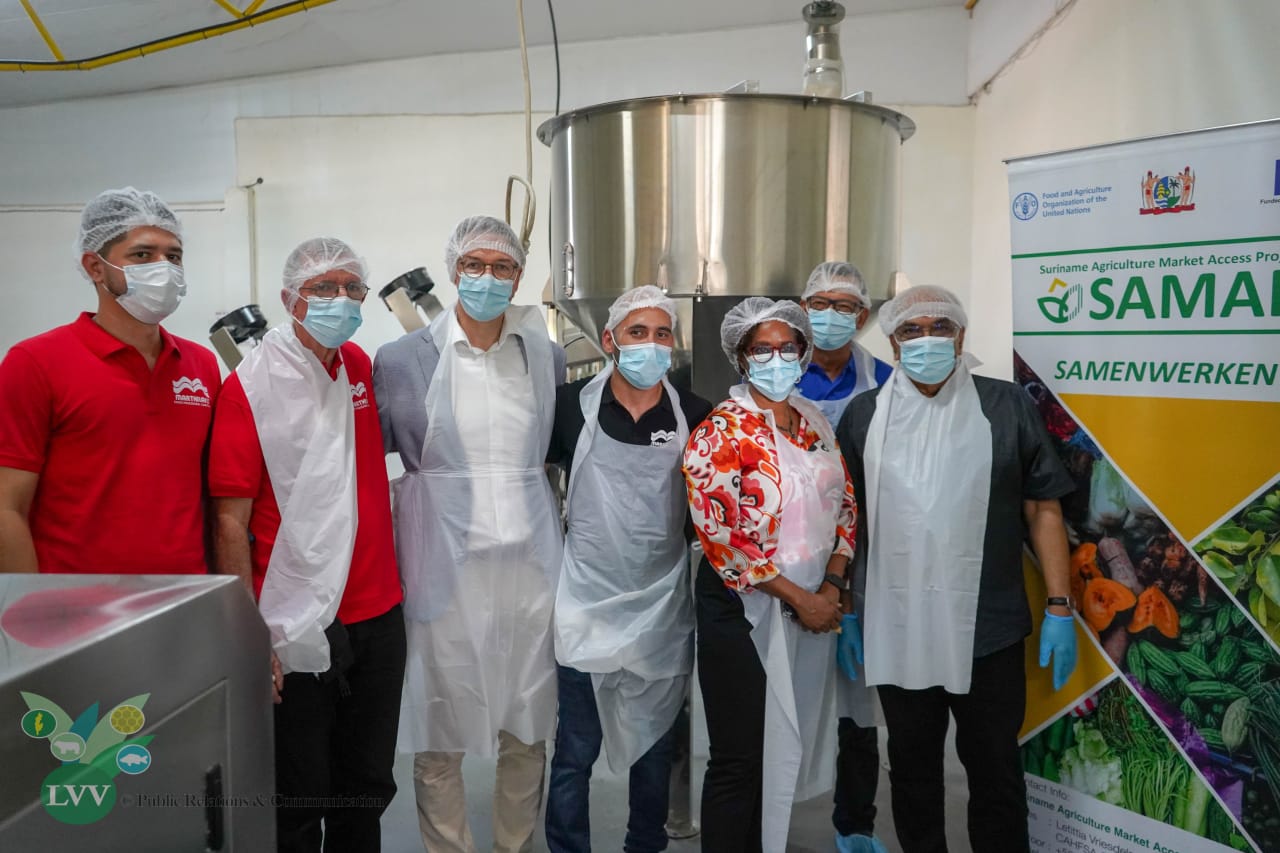Para, April 25, 2025 – During an atmospheric ceremony at Marthiland, the official closing of the Suriname Agriculture Market Access Project (SAMAP) took place today. Since 2018, SAMAP has made significant strides in strengthening Suriname’s agricultural sector, and today we not only looked back at the results achieved, but also looked ahead to the future — with the launch of BamBino, Suriname’s first locally produced cassava porridge.
The ceremony was opened by Prithvi Jairam, former Grant Operations Officer of SAMAP, who also presented the programme on behalf of FAO.
In his opening speech, Jairam personally looked back on his many years of involvement with SAMAP: from the first information sessions to supporting more than 200 agribusinesses, farmers and cooperatives.
“SAMAP was not a panacea, but a catalyst,” he said. His words, carried by sincere emotion and deep connection, visibly touched the audience. Special thanks were also given to the former SAMAP team during the ceremony.
The speeches recognised that the results achieved were not only due to investments and infrastructure, but above all to the hard work, dedication and resilience of the employees involved.
From dream to reality
The ceremony also focused on the story of Jonas van Ravenszwaay and Jack Lie A Fat: how an initially rejected proposal ultimately resulted in one of the most ambitious initiatives under SAMAP, with the support of a network of twenty cassava farmers from Para and Wanica.
The unveiling of the final product BamBino — gluten-free, with no added sugars or preservatives — marked the tangible result of this collaboration.
Encouraged by Jairam, the audience counted down to the moment of unveiling, which was followed by loud applause.
Partnerships as a foundation
SAMAP, funded by the European Union and implemented by the Food and Agriculture Organization of the United Nations (FAO), supported more than 200 agribusinesses, farmers and cooperatives in Suriname through the Matching Grant Facility.
In total, more than 14,000 pieces of agricultural equipment and support were delivered — from simple implements to large machinery and innovative processing lines, such as the cassava porridge production line at Marthiland. During the speeches it became clear that SAMAP was much more than a classic development project.
The European Union highlighted the impact of the investment of more than USD 15 million in Suriname’s agricultural sector, with results reaching deep into the interior, including the outreach to communities led by Granman Aboikoni.
Jonas van Ravenszwaay underlined that SAMAP did not only bring machinery, but also knowledge, capacity building and new opportunities, and expressed his gratitude on behalf of more than 200 agribusinesses and farmers. Minister Parmanand Sewdien stressed that SAMAP was not a political project, but a national model for cooperation.
He noted that even other sectors now recognize how much stronger development can be when collaboration and shared goals are central — an important lesson that SAMAP has failed to teach.
Final chord with symbolism
After the unveiling of the new product, the official start-up of the cassava processing line followed. The official delegation, including the Minister and the EU Ambassador, performed the opening act by symbolically pressing the start button, after which a live demonstration of the operation of the new production line followed.
After the delegation, all attendees were given the opportunity to walk inside, view the installation up close and see how it works for themselves.
Visitors were kindly requested to exercise caution around the machines, after which they enjoyed catering and an outdoor mini-exhibition showcasing selected SAMAP-supported products and innovations.
On a warm, connecting note, Jairam concluded the formal part of the ceremony, not only honoring the project’s achievements but also expressing confidence that the foundations built will continue to grow.
A new beginning for Surinamese agriculture The message of the day was clear: although the SAMAP project is formally ending, the foundation that was built will continue to exist. The collaboration, innovations and capacities that were developed under SAMAP live on in every field, greenhouse and market in Suriname. SAMAP’s true legacy is found in the growing communities, the strengthened chains and the confidence in the future of Surinamese agriculture.
Original article from Ministry of Agriculture, Animal Husbandry and Fisheries, Suriname


